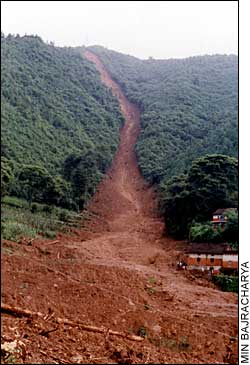 This week's rains and floods were a metaphor for the crisis battering this country. While nothing can be done about mother nature, there is plenty that can be done about the motherland.
This week's rains and floods were a metaphor for the crisis battering this country. While nothing can be done about mother nature, there is plenty that can be done about the motherland. Officials say that we suffered a natural disaster. But just like everything else in this country, it was a largely man-made disaster. Monsoon cloudbursts and earthquakes have been happening in the Himalaya even before humans started settling in these hills. But rains and quakes don't kill people, buildings and the sites of settlements do.
Natural events mostly kill people when we don't follow traditional wisdom about locating communities, ensuring proper land use and building codes, or don't have adequate disaster preparedness and prompt relief.

Urban sprawl and social inequities send squatters to live on, and farm, vulnerable flood plains. Badly-designed roads, bridges and embankments exacerbate floods. As long as we seek only engineering solutions that do not treat river basins as drainage systems and obstruct their flow, we will keep having man-made disasters. Let's not pass the buck and blame nature.
This week's floods over central and eastern Nepal were much worse because we have, through our own misjudgement and incompetence, lost the first line of defence in times of calamity: Nepal's efficient and reliable telephone system. More than 20 of our 75 districts have been without phones for most of this year thanks to the revolutionary zeal of our comrades who have blown up telecom towers as part of their effort to build a new Nepal. Without rapid information, there will not be much relief to coordinate. Four days after the deluge, we still do not have an accurate picture of the true extent of the damage to life and property.
Then, it used to be local police posts, elected village councils, district-level officials and Members of Parliament who used to galvanise local relief work, and draw the attention of faraway Kathmandu to rush aid. None of them exist anymore. In many districts there isn't a single unit of local, district or national government left.
So, when a landslide or flashflood strikes, as it did in Khotang two weeks ago, or in Saptari, Chitwan or Makwanpur this week, there is no one to take charge of relief. People are left to fend for themselves the best that they can.
Luckily for the impervious politicians in Kathmandu, most Nepalis have come to expect little from them. The people will get by, like they always have, with community and self-help. But this time they will also curse callous and unfeeling officials who couldn't be bothered. People whose binding motto seems to be: live for the minute, who cares what happens after we are gone. Madame de Pompadour is supposed to have said it best: "Apres moi, le deluge."


